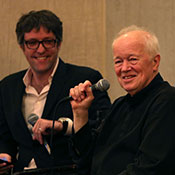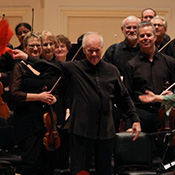
MSO Performs John Adams’s The Chairman Dances
David Lewellen
PUBLISHED
Tagged Under:
When the Milwaukee Symphony gave the world premiere of John Adams’ The Chairman Dances in 1986, Roger Ruggeri had no idea that it would become a repertory staple.
“I think in retrospect, it seems more interesting than it was at the time,” said Ruggeri, who served for decades as the orchestra’s principal bass and program annotator. “The audience response was good. It was certainly not, ‘What the heck was that?’”
The MSO has given many premieres over the years, but The Chairman Dances, a 12-minute “foxtrot for orchestra,” has become established in the repertoire as one of the most popular classical pieces of the last half-century. The symphony has performed it on 12 concerts since then, and Edo de Waart, music director laureate, has programmed it to open the concerts that he will lead on Nov. 10-11.
Today, John Adams is easily the most famous living classical composer, but in 1986 he was still in his 30s and an up-and-comer. In subsequent years, the MSO has frequently performed his work – particularly under de Waart, whose relationship with the composer dates back to the 1970s, when Adams was living in the Bay Area and de Waart directed the San Francisco Symphony.
The Chairman Dances is related to, but not taken from, Adams’ opera Nixon in China, which premiered almost two years later. It was commissioned by a group of four orchestras, and Milwaukee got the world premiere, which Ruggeri suspects was mostly about the logistics of scheduling.
As the program annotator, Ruggeri was used to writing about new music. Lukas Foss, the MSO’s music director at the time, was a composer himself, and frequently programmed music written by him or by his friends and acquaintances. “His view of being a music director was very involved with composition,” Ruggeri said. “That was principally what he was interested in.”
He remembers many conversations with Foss about program notes; the music director wanted to make sure that notes for new pieces contained comments from the composers. “It shouldn’t be scholarly or historical, but you definitely wanted to know what the composer had to say about it,” Ruggeri said. “I would try to find some connection with the piece or the composer so people had some idea about what was at work.”
Another point of connection was that Ruggeri composed on the side, too; several of his pieces were performed by the MSO over the years. “I wasn’t aspiring to fame,” he said. “I was just following my areas of interest.”
He stepped down from the position of principal bass in 2003, on the assumption that “leaving before you’re thrown out is a good idea,” but he continued to play in the section until his retirement in 2013, which was also about the time that he stopped writing program notes.
Adams has sometimes visited Milwaukee to hear his compositions, and Ruggeri said, “It’s always interesting to hear what he’s coming up with. He’s been a wonderful creative force in this period.”



